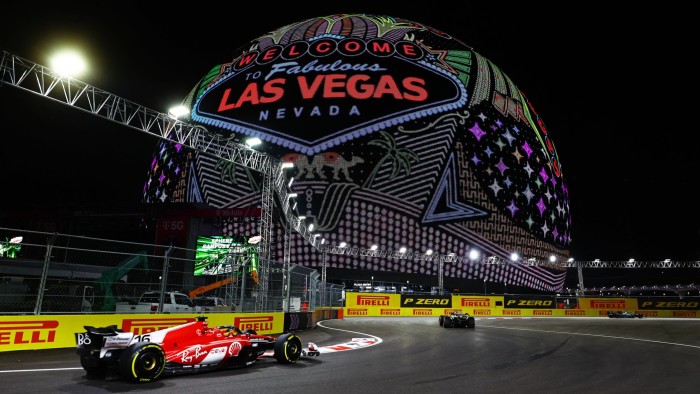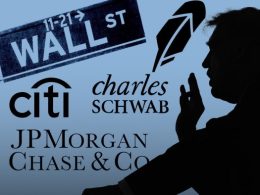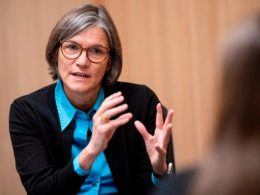Formula One made thousands of cheaper tickets available ahead of its return to Las Vegas, as the sport seeks to balance the glitz and glamour of a race along The Strip with a more affordable offering for its new US fans.
And those descending on the city in the Mojave Desert could yet witness a title-clinching race. Red Bull’s Max Verstappen is the bookies’ favourite to secure his fourth consecutive drivers’ championship, potentially as soon as this weekend.
Renee Wilm, chief executive of Las Vegas Grand Prix, says the decision to add more than 10,000 general admission tickets — the cheapest category — was because she and her team had “learned a ton” last year, when F1 returned to Vegas for the first time since 1982.
Wilm, who is also chief legal and administrative officer of Liberty Media, the owner of F1, says the plan, this year, is to cater to a broader spectrum of fans — ranging from “backpackers to billionaires” — to reflect the sport’s growing popularity. The organisers have also introduced a free daytime festival along Las Vegas Boulevard.
“We had a very high degree of high-end hospitality available last year,” recalls Wilm. “Unfortunately, what that means is that you end up with fewer fans, including the newer fans, that could participate.”
Under Liberty Media’s ownership, F1 has added Miami and Vegas to the race calendar, giving the series three races in the US, alongside Austin, Texas. This expansion has helped the sport take advantage of its growing popularity in a country where homegrown offerings, such as American football and baseball, dominate.
The success of behind-the-scenes Netflix series Formula 1: Drive to Survive has helped draw in new fans, including younger age groups and more women and girls, diversifying an audience that was ageing and male.
Vegas is a new breed of Grand Prix, “an embodiment of the ambition to bridge the gap between sport and entertainment”, says Anthony Dealtry of sports agency Octagon.
The resort city is becoming known as a sports hub, in addition to its association with gambling and entertainment. This weekend, it will also host a special edition of the Ferrari Challenge, a single-marque racing championship created in the early 1990s.
But, in a break from the traditional F1 business model, the racing in Vegas is promoted by LVGP, which is owned by Liberty Media and F1. Typically, F1 works with local race promoters, many of which have government backing, to stage Grand Prix weekends. This promoter pays F1 a fee and takes on responsibility for selling tickets.
By cutting out these local third-party promoters in Vegas, Liberty and F1 risk being left with unsold tickets. However, they believe this direct approach helps to develop a deeper understanding of the fan base.
Vegas has also helped F1 build partnerships with sponsors. Last month, it agreed an upgraded deal with American Express — the credit card company is now a global partner, the highest tier, having originally signed a regional partnership that began in Vegas last year.
Shiz Suzuki, vice-president global brand sponsorships and experiential marketing at American Express, says Las Vegas is the “number one travel destination for our American Express US card members”, adding: “There’s a huge growth in terms of popularity of the sport among millennial and Gen Z.”
Another example is the recent deal with luxury brands group LVMH, which last year teamed up with F1 in Vegas to add tequila to its traditional “beer and wine” offering.

“We were very thoughtful about the types of partners we went after for Vegas and how, again, that’s just bled out to the global business by showing how different sponsorship can be from traditional trackside signage and Paddock Club [hospitality] tickets,” says LVGP’s commercial chief Emily Prazer.
F1 invested $500mn last year getting Las Vegas ready for the return of racing, and the event attracted a cumulative attendance of 315,000. As an additional race, it also helped lift F1’s annual revenue by a quarter to more than $2.5bn in 2023, and operating profit by 64 per cent, to $392mn.
The event boosted the local economy by $1.5bn, according to research cited by the Nevada-based Clark County — although this included the one-off infrastructure spending, on an all-year round, multi-use complex known as Grand Prix Plaza.
Still, the street race had its critics because of the inconvenience it caused the local community. F1 repaved 6km of road for the race, which led to traffic jams and disruption to small businesses.
The organisers are under pressure to show they have learnt from last year. Wilm acknowledges there is “room for improvement” in communications but believes lessons have been learnt.
“We’re so much smarter in year two than we were in year one,” Wilm says. “We’ve been able to deploy those learnings to really minimise disruption to the town.”
Source link









